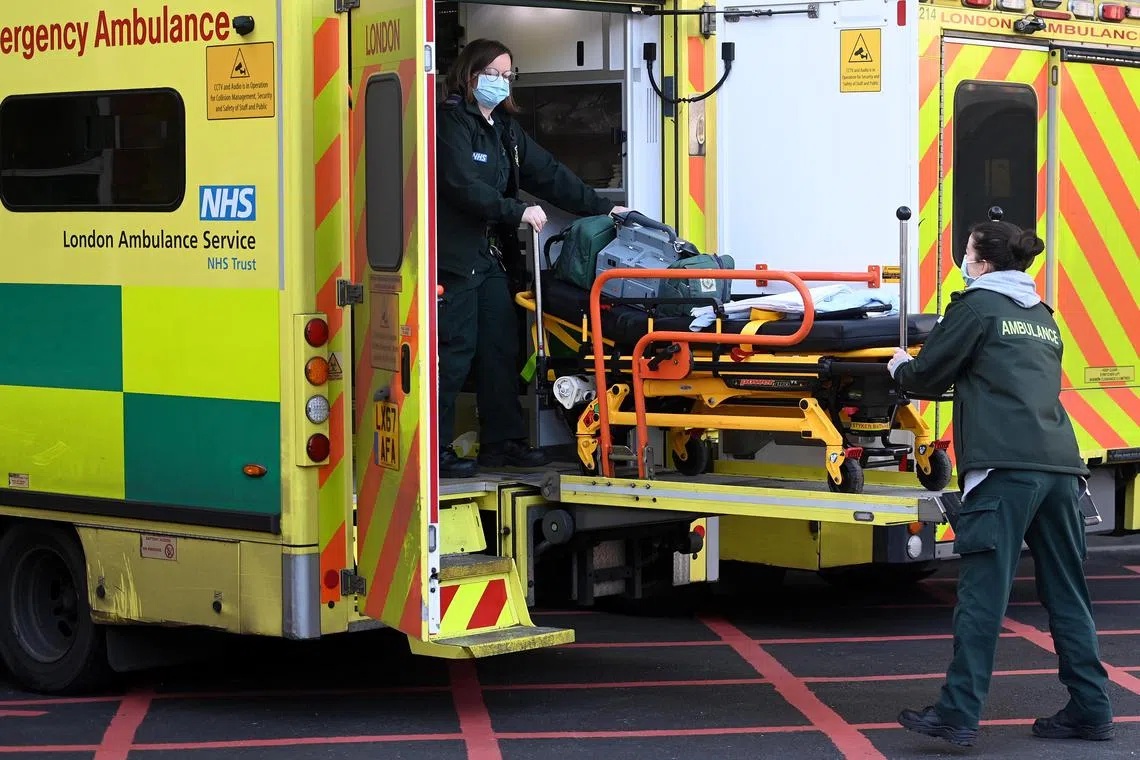UK sees ‘significant’ health service disruption from strikes
Sign up now: Get ST's newsletters delivered to your inbox

Nurses and ambulance staff prepare to go on strike in the run-up to Christmas.
PHOTO: EPA-EFE
LONDON – Prime Minister Rishi Sunak’s government warned Britons to brace themselves for “significant disruption” in the country’s health service as nurses and ambulance staff prepare to go on strike in the run-up to Christmas.
About 600 members of Britain’s three branches of the armed forces are being trained to drive ambulances, with another 150 being prepared to provide logistical support, according to a person familiar with the matter. The military has also been asked to step in
“There will be significant disruption to the service the NHS is able to provide to the public if strike action goes ahead,” Mr Sunak’s spokesman Max Blain told reporters on Monday, referring to the state-funded National Health Service. “Of course, we are able to mitigate it with some of these measures, and other plans will be discussed today, but the public should be prepared for disruption.”
On Monday, Cabinet Office minister Oliver Dowden chaired a meeting of the government’s emergency Cobra committee as ministers sought to soften the blow of escalating industrial action that also includes railway and postal workers, the border force and bus drivers.
Mr Sunak’s government faces the biggest wave of industrial strife since the 1980s, with strikes planned for almost every day of December as public-sector workers demand pay rises that keep pace with inflation at a 41-year high of more than 11 per cent.
Nurses
Unprecedented walkouts by as many as 100,000 nursing staff on Thursday and next Tuesday will go ahead after ministers on Sunday rejected a union offer to suspend industrial action in return for talks over pay.
Health Secretary Steve Barclay held a meeting with the Royal College of Nursing (RCN) late on Monday, but the subject of pay was not up for discussion, Mr Blain said beforehand.
“The government was true to its word – they would not talk to me about pay,” RCN general-secretary Pat Cullen said in a statement following the meeting. “I needed to come out of this meeting with something serious to show nurses why they should not strike this week. Regrettably, they are not getting an extra penny.”
The RCN is demanding a pay rise of 5 per cent above the retail price index inflation rate – currently at 14.2 per cent – to make up for years of wage restraint.
Mr Barclay told the RCN that any further pay increase would mean taking money from front-line services, a spokesman for the Department of Health and Social Care said. Mr Barclay will continue to engage with the union as the government moves into the pay review process for 2023, and on non-pay related issues, they said.
Opposition Labour Party leader Keir Starmer told LBC radio that the pay demands of nurses are “more than can be afforded by the government” but added that it is incumbent on ministers to negotiate with the unions to avert strikes.
The Night Time Industries Association said that bookings are down 30 per cent as a result of the poor weather and transport strikes in what would normally be a busy season of Christmas parties. It estimated the hit to the industry at £2 billion (S$3.3 billion).
Inflation
The government has offered 5 per cent pay rises on average for public-sector workers, and insists inflation-matching increases or above are unaffordable and would risk a spiral of price hikes across the economy. Handing every government worker an 11 per cent rise would cost taxpayers about £28 billion, the government has said.
“Fundamentally, inflation is the enemy that we are all seeking to face,” Mr Blain said. “That is again why we don’t think it’s right to match the union demands for double-digit pay rises, which would simply embed inflation for the long term.”
More than 40,000 rail workers held two 48-hour strikes starting on Tuesday, affecting services across the country in the run-up to Christmas. The disruption to rail transport was made even worse on Monday when freezing temperatures and snow led to widespread service cancellations. Further industrial action is planned from Dec 24 and early in the New Year.
Around 1,000 Border Force officers are due to walk out
Military personnel and civil servants will receive training over the next weeks to support a range of services including the Border Force at airports and ports in the event of strike action, the government said in a statement on Sunday.
The armed forces will also be deployed to hospital trusts across the country to “familiarise themselves with vehicles” ahead of an ambulance strike involving thousands of workers planned for Dec 21. The service, which plans another strike on Dec 28, will continue to respond to life-threatening incidents.
A second emergency meeting – also led by Mr Dowden – is scheduled to take place on Wednesday. Both meetings will involve transport, health, home office and defence ministers.
“The stance the unions have taken will cause disruption for millions of hardworking people over the coming weeks,” Mr Dowden said in a statement. “The government will do all it can to mitigate the impact of this action, but the only way to stop the disruption completely is for union bosses to get back round the table and call off these damaging strikes.” Bloomberg


